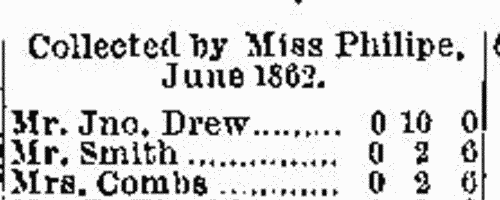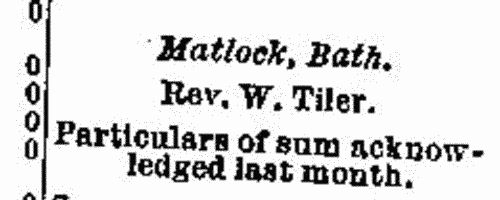Add this eBook to your basket to receive access to all 206 records. Our indexes include entries for the spelling minns. In the period you have requested, we have the following 206 records (displaying 101 to 110): These sample scans are from the original record. You will get scans of the full pages or articles where the surname you searched for has been found. Your web browser may prevent the sample windows from opening; in this case please change your browser settings to allow pop-up windows from this site. Unclaimed Dividends
(1855)
The unclaimed dividend books of the Bank of England, containing names and descriptions of over 20,000 persons entitled to many millions of pounds accumulated in the bank unclaimed during the 18th and 19th centuries, mostly in consols and annuities, and transferred to the Commissioners for the Reduction of the National Debt.
| Sample scan, click to enlarge

| Traders and professionals in London
(1856)
The Post Office London Directory for 1856 includes this 'Commercial and Professional Directory', recording over 100,000 individuals. | Sample scan, click to enlarge

|  London Policemen
(1843-1857) London Policemen
(1843-1857)
The Metropolitan Police Register of Joiners (MEPO 4/334) lists policemen joining the force 1 January 1843 to 1 April 1857 (warrant numbers 19893 to 35804). The register is alphabetical, in so far as the recruits are listed chronologically grouped under first letter of surname. It gives Date of Appointment, Name, Number of Warrant, Cause of Removal from Force (resigned, dismissed, promoted or died), and Date of Removal. Although the register was closed for new entrants at the end of 1842, the details of removals were always recorded, some being twenty or more years later. Those recruits not formerly in the police, the army, or some government department, were required to provide (normally) at least two letters of recommendation from persons of standing, and details of these are entered on the facing pages: the names in these are indexed separately - this index refers only to the police constables. Where a recruit was only recently arrived in the metropolis, the names and addresses of the recommenders can be invaluable for tracing where he came from. | Sample scan, click to enlarge

|  Persons of standing recommending London police recruits
(1843-1857) Persons of standing recommending London police recruits
(1843-1857)
The Metropolitan Police Register of Joiners (MEPO 4/334) lists policemen joining the force 1 January 1843 to 1 April 1857 (warrant numbers 19893 to 35804). The register is alphabetical, in so far as the recruits are listed chronologically grouped under first letter of surname. It gives Date of Appointment, Name, Number of Warrant, Cause of Removal from Force (resigned, dismissed, promoted or died), and Date of Removal. Although the register was closed for new entrants at the end of 1842, the details of removals were always recorded, some being twenty or more years later. Those recruits not formerly in the police, the army, or some government department, were required to provide (normally) at least two letters of recommendation from persons of standing, and details of these are entered on the facing pages. Where a recruit was only recently arrived in the metropolis, the names and addresses of the recommenders can be invaluable for tracing where he came from. Those recruits not formerly in the police, the army, or some government department, were required to provide (normally) at least two letters of recommendation from persons of standing, and details of these are entered on the facing pages: the names in these are indexed here (the police recruits are indexed separately and not included here). Recruits transferred from other forces or rejoining the force did not normally need recommendations - in the latter case, former warrant numbers are given - but some recommendations are from police inspectors, even other constables. Recruits coming from the army sometimes have general military certificates of good conduct, but most often have a letter from their former commanding officer; recruits recommended by government departments (most often the Home Office) similarly have letters from the head of department. But the great majority of the names and addresses in these pages are of respectable citizens having some sort of personal acquaintance with the recruit. Where more than two recommendations were provided, the clerk would only record one or two, with the words 'and others'. Tradesmen are sometimes identified as such by their occupations; there are some gentry. Although the bulk of these names are from London and the home counties, a scattering are from further afield throughout Britain and Ireland. | Sample scan, click to enlarge

|  Sailors and marines awarded the Baltic Medal
(1854-1857) Sailors and marines awarded the Baltic Medal
(1854-1857)
During the Crimean War, a British and French fleet entered the Baltic, and captured Bomarsund harbour and one of the Aland Islands (now part of Finland). Bomarsund is the sound between the islands and the Swedish island of Vardo; and at the fine harbour on Bomarsund, dominating the entrance of the Gulf of Bothnia, and indirectly that of the Gulf of Finland, the Russians had constructed a northern naval base, and this was destroyed in the attack. The British fleet taking part in the Baltic expedition comprised Her Majesty's ships Aeolus, Ajax, Alban, Algiers, Amphion, Archer, Arrogant, Basilisk, Belleisle, Blenheim, Boscawen, Bulldog, Caesar, Calcutta, Centaur, Colossus, Conflict, Cornwallis, Cossack, Cressy, Cruizer, Cuckoo, Cumberland, Dauntless, Desperate, Dragon, Driver, Duke of Wellington, Edinburgh, Esk, Euryalus, Exmouth, Falcon, Firefly, Geyser, Gladiator, Gorgon, Hannibal, Harrier, Hastings, Hawke, Hecla, Hogue, Imperieuse, James Watt, Leopard, Lightning, Locust, Magicienne, Majestic, Merlin, Miranda, Monarch, Neptune, Nile, Odin, Orion, Otter, Pembroke, Penelope, Pigmy, Porcupine, Prince Regent, Princess Royal, Pylades, Resistance, Retribution, Rhadamanthus, Rosamond, Royal George, Royal William, Russell, St George, St Jean D'Acre, St Vincent, Sphinx, Stromboli, Tartar, Termagant, Tribune, Tyne, Valorous, Volage, Volcano, Vulture, Wrangler and Zephyr. This is the medal roll of the naval and marine claimants who qualified for the Baltic Medal for service in 1854 to 1855. The medals were dispatched in batches from early 1857, the first batch being numbered B A 1, the next B A 2, &c.; then follows the destination (a place or, more usually, a ship) and the date of dispatch. Most of the medals had been sent by the end of 1857. | Sample scan, click to enlarge

| Customs Officers in Southampton
(1858)
Complete lists of serving customs officers and clerks in the Port of London and all the outports of Britain and Ireland (including the Isle of Man and the Channel Islands) were published each year in The British Tariff. This issue is corrected to 30 September 1858: the sample scan shows the entry for Hartlepool. | Sample scan, click to enlarge

|  Sailors and marines on board Her Majesty's ship Cormorant
(1856-1860) Sailors and marines on board Her Majesty's ship Cormorant
(1856-1860)
The China Medal was awarded to soldiers and sailors involved in the various actions of the war against China, in which this ship was engaged from 1856 to 1860. The medals were either delivered on board or sent on in 1862: except that many of the men were no longer immediately traceable, and the remarks on the roll show that some medals were not sent on for several years, and some were never sent. After the main roll there is a section showing which of the men also qualified for clasps. Separate clasps were awarded for men who had been in receipt of the China Medal of 1842; for the taking of Fatshan in 1857, Canton in 1857, Taku Forts in 1858, Taku Forts in 1860, and Pekin in 1860. Most of the men on this ship are shown as having been given the Taku Forts 1858 clasp, for being actually engaged in the operations which ceased with the first capture of the Taku Forts, 20 May 1858, and led to the Treaty of Tientsin. | Sample scan, click to enlarge

| Unclaimed Naval Prize Money from the China War
(1856-1860)
Various prize moneys were awarded to officers and men who served on board her Majesty's ships on the China Station during the war of 1856 to 1880. Firstly, there was a parliamentary grant of one month's pay to those serving on the Acorn*, Actaeon*, Adventure, Algerine*, Amethyst, Assistance*, Banterer*, Barracouta, Belleisle, Bustard, Calcutta*, Camilla, Clown*, Comus, Cormorant, Cruiser*, Drake*, Elk*, Encounter, Esk*, Firm*, Forester*, Furious*, Fury, Haughty*, Hesper*, Highflyer*, Hornet*, Inflexible*, Janus*, Kestrel*, Lee*, Leven*, Melville, Minden, Nankin*, Niger*, Nimrod*, Opossum*, Pique, Plover*, Princess Charlotte, Racehorse*, Raleigh, Sampson*, Sans Pareil*, Slaney*, Spartan, Starling*, Staunch*, Surprise*, Sybille*, Tribune, Volcano*, Watchful*, Winchester, and Woodcock*; in addition Canton booty was awarded to those serving on the ships asterisked (plus the Bittern and Coromandel tenders) at Canton on 28 and 29 December 1857, when that city was bombarded and captured. Then those on board the Bustard, Cruiser, Esk, Forester, Haughty, Highflyer, Lee, Niger, Nimrod, Sampson, Surprise, and the boats of the Elk, were rewarded for the captures of junks for breach of blockade of Canton River between 29 August and 19 December 1857. Other captures made by her Majesty's ships led to various other awards distributed between 1 January 1855 and 19 February 1863. Nevertheless, for one reason or another a substantial number of these prizes, from as little as 1s 7d to as much as £28, remained undistributed by 1902, when this comprehensive list of the unclaimed moneys was printed. In each case the sailor's name is given first (surname, then christian name or initials); rank or rating; ship in which serving at time of capture or award; parliamentary award; Canton booty; captures for breach of blockade of Canton River; other captures; and then the total. | Sample scan, click to enlarge

| Missionaries and contributors
(1863)
The Evangelical Magazine and Missionary Chronicle records the work of Christian missionaries throughout the world, and of the supporting missionary societies collecting money for the work in the British Isles. Contributions are listed by congregation, and by family members making donations. | Sample scan, click to enlarge

| Missionaries and contributors
(1864)
The Evangelical Magazine and Missionary Chronicle records the work of Christian missionaries throughout the world, and of the supporting missionary societies collecting money for the work in the British Isles. Contributions are listed by congregation, and by family members making donations. | Sample scan, click to enlarge

|
Research your ancestry, family history, genealogy and one-name study by direct access to original records and archives indexed by surname.
|












